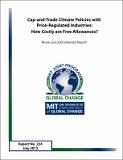| dc.contributor.author | Bruno, Lanz, 1980- | |
| dc.contributor.author | Rausch, Sebastian | |
| dc.date.accessioned | 2012-07-10T17:27:09Z | |
| dc.date.available | 2012-07-10T17:27:09Z | |
| dc.date.issued | 2012-07-10 | |
| dc.identifier.uri | http://hdl.handle.net/1721.1/71570 | |
| dc.description | http://globalchange.mit.edu/research/publications/reports/all | en_US |
| dc.description.abstract | We examine the impacts of alternative cap-and-trade allowance allocation designs in a model of the
U.S. economy where price-regulated electric utilities generate 30% of total CO2 emissions. Our empirical
model embeds a generator-level description of electricity production—comprising all 16,891 electricity
generators in the contiguous U.S.—in a multi-region multi-sector general equilibrium framework that
features regulated monopolies and imperfectly competitive wholesale electricity markets. The model recognizes
the considerable heterogeneity among households incorporating all 15,588 households from the
Consumer and Expenditure Survey as individual agents in the model. Depending on the stringency of the
policy, we find that distributing emission permits freely to regulated utilities increases welfare cost by 40-
80% relative to an auction if electricity rates do not reflect the opportunity costs of permits. Despite an
implicit subsidy to electricity prices, efficiency costs are disproportionately borne by households in the
lowest income deciles. | en_US |
| dc.description.sponsorship | The Joint Program on the
Science and Policy of Global Change is funded by the U.S. Department of Energy, Office of
Science under grants DE-FG02-94ER61937, DE-FG02-93ER61677, DE-FG02-08ER64597, and
DE-SC0003906; the U.S. Department of Energy, National Renewable Energy Laboratory under
grant XEU-0-9920-01; the U.S. Environmental Protection Agency under grants XA-83344601-0,
XA-83240101, PI-83412601-0, and RD- 83427901-0; the U.S. National Science Foundation
under grants SES-0825915, EFRI-0835414, BCS-0410344, ATM-0329759, DMS-0426845, and
AGS-0944121; the U.S. National Aeronautics and Space Administration under grants
NNX07AI49G, NNX08AY59A, NNX06AC30A, NNX09AK26G, NNX08AL73G,
NNX09AI26G, NNG04GJ80G, NNG04GP30G, and NNA06CN09A; the U.S. National Oceanic
and Atmospheric Administration under grant NA070AR4310050; the U.S. Federal Aviation
Administration under grants 06-C-NE-MIT and 09-C-NE-MIT; the U.S. Department of
Transportation under grant DTRT57-10-C-10015; the U.S. Department of Agriculture under grant
58-0111-9-001; the Electric Power Research Institute under grant EP-P32616/C15124; and a
consortium of 40 industrial and foundation sponsors (for a complete list see:
http://globalchange.mit.edu/sponsors/all). | en_US |
| dc.language.iso | en_US | en_US |
| dc.publisher | MIT Joint Program on the Science and Policy of Global Change | en_US |
| dc.relation.ispartofseries | Joint Program Report Series;224 | |
| dc.rights | An error occurred on the license name. | en |
| dc.rights.uri | An error occurred getting the license - uri. | en |
| dc.title | Cap-and-Trade Climate Policies with Price-Regulated Industries: How Costly are Free Allowances? | en_US |
| dc.type | Technical Report | en_US |
| dc.identifier.citation | Report 224 | en_US |
